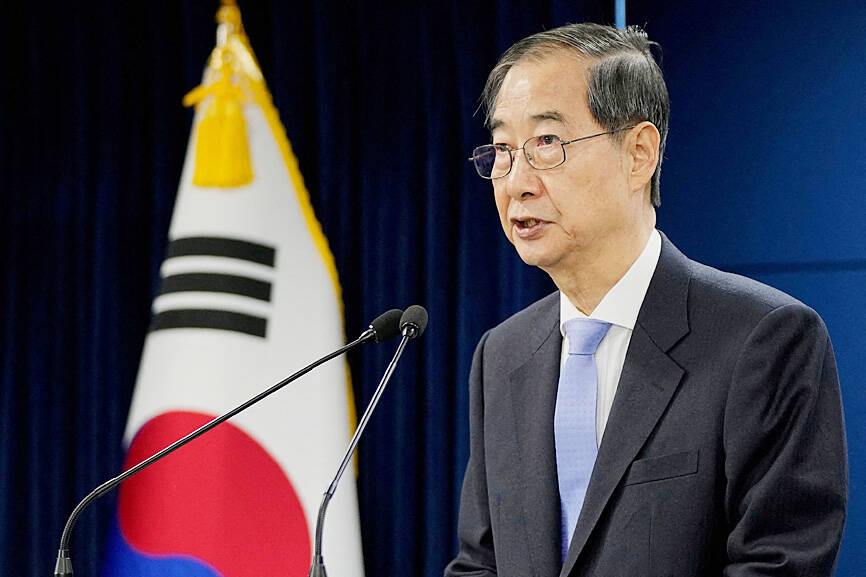The Constitutional Court yesterday dismissed the impeachment of South Korean Prime Minister Han Duck-soo, reinstating him as acting president — a role he took after the president was suspended for declaring martial law.
The court ruling is the latest development in South Korea’s complex and sprawling political crisis, which South Korean President Yoon Suk-yeol started with a short-lived attempt to subvert civilian rule in December last year.
Lawmakers defied armed soldiers at parliament to vote down Yoon’s Dec. 3 martial law declaration and impeached him soon after, with Han stepping in as acting president, but he was himself impeached by lawmakers just weeks later over his purported involvement in the martial law debacle, plus a dispute over judicial appointments.

Photo: Reuters
“The Constitutional Court has rendered a decision to reject the impeachment trial request against Prime Minister Han Duck-soo,” the court said in a statement yesterday.
The court ruled five to one against Han’s impeachment, with two judges arguing the case should not have made it to court as lawmakers did not have a super majority to impeach him in the first place.
Han’s actions while in office “cannot be seen as constituting a betrayal of the people’s trust indirectly granted through the president” the court ruled.
The decision is effective immediately and cannot be appealed.
Han, who immediately resumed the acting presidency yesterday, thanked the Constitutional Court for its “wise decision.”
“I believe that all citizens are clearly speaking out against the highly polarized political sphere. I think there is no place for division now. Our country’s priority is to move forward,” he said.
The court’s decision was closely watched as it comes ahead of a highly anticipated ruling on Yoon’s impeachment, the date of which has not yet been announced.
Despite experts predicting a verdict on that case by the middle of this month, the Constitutional Court has yet to rule, making Yoon’s case the longest deliberation in its history.
Opposition leader Lee Jae-myung said the verdict on Han should not be “disrespected,” but urged the Constitutional Court to move more swiftly on Yoon’s case.
“The entire nation is losing sleep over Yoon Suk-yeol’s illegal military coup,” he said, adding that it was “hard to fathom why the Constitutional Court continues to postpone the ruling date.”
“Every day, every hour, every minute, every second, the international trust in the Republic of Korea is being broken, the economic damage is mounting,” he added.
If Yoon’s impeachment is upheld, South Korea must hold fresh elections within 60 days of the verdict.
Yoon was arrested in January in a dawn raid in connection to a separate criminal investigation on insurrection charges — which are not covered by presidential immunity.
Yoon is the first sitting South Korean president to stand trial in a criminal case.
He was released from detention earlier this month on procedural grounds — a move that has appeared to invigorate his supporters.
Hundreds of thousands took to the streets over the weekend, as rallies for and against Yoon intensified ahead of the court verdict.

The CIA has a message for Chinese government officials worried about their place in Chinese President Xi Jinping’s (習近平) government: Come work with us. The agency released two Mandarin-language videos on social media on Thursday inviting disgruntled officials to contact the CIA. The recruitment videos posted on YouTube and X racked up more than 5 million views combined in their first day. The outreach comes as CIA Director John Ratcliffe has vowed to boost the agency’s use of intelligence from human sources and its focus on China, which has recently targeted US officials with its own espionage operations. The videos are “aimed at

STEADFAST FRIEND: The bills encourage increased Taiwan-US engagement and address China’s distortion of UN Resolution 2758 to isolate Taiwan internationally The Presidential Office yesterday thanked the US House of Representatives for unanimously passing two Taiwan-related bills highlighting its solid support for Taiwan’s democracy and global participation, and for deepening bilateral relations. One of the bills, the Taiwan Assurance Implementation Act, requires the US Department of State to periodically review its guidelines for engagement with Taiwan, and report to the US Congress on the guidelines and plans to lift self-imposed limitations on US-Taiwan engagement. The other bill is the Taiwan International Solidarity Act, which clarifies that UN Resolution 2758 does not address the issue of the representation of Taiwan or its people in

SHIFT: Taiwan’s better-than-expected first-quarter GDP and signs of weakness in the US have driven global capital back to emerging markets, the central bank head said The central bank yesterday blamed market speculation for the steep rise in the local currency, and urged exporters and financial institutions to stay calm and stop panic sell-offs to avoid hurting their own profitability. The nation’s top monetary policymaker said that it would step in, if necessary, to maintain order and stability in the foreign exchange market. The remarks came as the NT dollar yesterday closed up NT$0.919 to NT$30.145 against the US dollar in Taipei trading, after rising as high as NT$29.59 in intraday trading. The local currency has surged 5.85 percent against the greenback over the past two sessions, central

US Indo-Pacific Commander Admiral Samuel Paparo on Friday expressed concern over the rate at which China is diversifying its military exercises, the Financial Times (FT) reported on Saturday. “The rates of change on the depth and breadth of their exercises is the one non-linear effect that I’ve seen in the last year that wakes me up at night or keeps me up at night,” Paparo was quoted by FT as saying while attending the annual Sedona Forum at the McCain Institute in Arizona. Paparo also expressed concern over the speed with which China was expanding its military. While the US